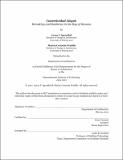| dc.description.abstract | This thesis investigates the rapid rate at which the changing of ownership, production, and policy has affected the Bay of Havana. In 2009, the Cuban government designated a single free port on the island just 40 kilometers west of the Bay. The Mariel marked an era of economic restructuring, a common occurrence in the past century. These policy changes aim to ease the day-to-day lives of Cuban citizens but also leave them vulnerable to foreign industries who seek to mine the area for its unregulated resources, cheap labor, and proximity to US trade flows. The Bay, as a site of this intense geopolitical speculation and aging infrastructure, is emblematic of Cuba as a whole.
The Bay, bracketed by an inoperable oil refinery and a degrading thermoelectric plant, is currently characterized by abandoned industry. While these forgotten sites restrict pedestrian access and foster pollution, they provide a critical connection to the shoreline, and therefore to the world at-large. The project is a speculation of a future that aims to return this site to its citizenry. It argues for the Cuban philosophy of resolver to leverage the resilient culture of Havana’s citizens against foreign opportunism. It explores the transformation of the site over the next five decades, as it adapts to the everchanging economic, social, and political landscape of the country. The project salvages key components of the site, as opposed to depleting it of its resources. It develops new industries along the entire shore, adapted from abandoned factories, which circumvent material scarcity and access restrictions. The thesis operates between Havana’s historic ebb and flow of scarcity and surplus, defining a new vernacular of grassroots urbanism. | |
